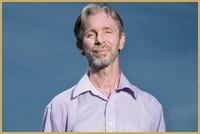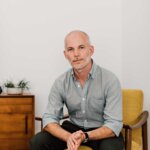Stephen McManus spent most of the Xtra West Community Achievement Awards ceremony sitting quietly on a plush-covered bench behind the DJ booth at Celebrities. His partner Fred sat with him and they conversed lightly, pausing now and then to listen to the winners’ speeches from the podium.
Like all the best super heroes, the mild-mannered McManus only reveals his powers when called upon to do so. Two such efforts–the Save St Paul’s Coalition and the Proud to Quit campaign–garnered him the award for Community Hero of the Year May 14.
McManus doesn’t present himself as a hero, of course. “I’m not an activist,” the 53-year-old protests. “I just do it.” He’s soft-spoken in person (Canadian to the point of pronouncing AZT “A-Zed-T”).
His childhood was spent in North Burnaby where he grew up with no sense of community at all, he says. That changed when, in 1975, he came out of the closet and found himself living a new life in Vancouver.
“We had no protection,” says McManus of 1970s Vancouver. “You could be fired for coming out. Most of us were leading double lives.”
Luckily, a job in the floral department of a North Shore garden store provided a gay-positive space where McManus’ work life and social life could co-exist without fear of censure.
McManus has since made it his business to work for causes that are socially significant and which directly affect his community.
In the 1970s, his coming-out process was “totally magical,” says McManus. He recalls entering bars (“which is where the entire gay community existed in 1975”) and “entering another world.”
Soon he found himself participating in his first Pride Parade. It was Vancouver’s first Pride Parade, too.
“It was a protest march,” he explains. “We marched down Pendrell St, because it was the only one we could get.”
Then AIDS appeared in the early 1980s, and McManus found a new activist calling.
“We held a meeting at the West End Community Centre,” he recalls. “I remember the shock in the audience when three people stood up and identified themselves as HIV-positive. We didn’t know if they were contagious. We didn’t know if we could get it from just being in the room with them.”
McManus is a little old-school by today’s hipster, post-gay standards, and he’s fine with that. Brokeback Mountain, as far as he’s concerned, was a film about “two straight guys with homoerotic attraction,” since there was no gay community, no gay context for the film’s sheepherders to participate in.
“I have this sense of identity,” he explains, “yet it’s not universal.” Gay activism, the forging of gay community, is what allows gay identities to exist in the first place, he says. So men having sex with men in a vacuum? That’s not gay. It takes a village.
“This construct of gay identity is artificial,” he says. “And it may not be enduring.”
Enduring or no, McManus has been working long hours to ensure that the gay culture that does exist is a healthy one.
Last spring, he co-founded the Save St Paul’s Coalition, a grassroots effort to stop Providence Health Care from moving the West End’s sole hospital to a new False Creek Flats location east of Main St.
Like many West End gays, and members of the HIV-positive community in particular, which relies so heavily on easy access to the hospital’s services, McManus is deeply concerned about the prospect of losing St Paul’s.
“We need a hospital to serve the 130,000 people living in this area,” he says, adding that leaving behind a few token services won’t be enough.
Some queers note that the False Creek site would be better positioned to serve the vulnerable populations of Vancouver’s Downtown Eastside. Others point to the fact that, unlike St Paul’s, the new hospital won’t crumble in the event of an earthquake.
But that positive is somewhat dampened by the fact that the False Creek site will be built below sea level, says McManus. In the event of an earthquake, it won’t matter that the new site will still be intact, since it will be intact below water.
More than just alarmed by the hospital’s proposed relocation, McManus is also upset about the lack of public consultation in the process thus far.
“[Providence] claims to be consulting the community,” says McManus, choosing his words very carefully. “But it’s been a very deceptive way of consulting–they’ve just been gathering information on people’s concerns so they can knock them down later.”
Last July, Providence’s chief architect told Xtra West the BC health ministry would take the lead in organizing consultations; two months ago, the health minister passed that responsibility back to Providence.
McManus isn’t satisfied.
“We hope we’ve pressured the provincial government to force [Providence’s] hand, though,” he says.
The Save St Paul’s Coalition recently sent the BC legislature more than 9,500 signatures on a petition to keep the hospital on Burrard St, since Victoria will ultimately have to approve any relocation plans before they can get underway. Though discussions have already begun between the health ministry and Providence, the two parties are still “some considerable distance from conclusion,” health minister George Abbott told Xtra West Mar 31.
Meanwhile, with a few hours left in the day, McManus also spent much of the last year working to keep his community hospital-free on another front.
His Proud to Quit campaign, which festooned the entire Davie Village with colourful advertisements, featured local celebs like drag maven Bill Monroe and DJ Dickey Doo encouraging queer folk to kick the habit.
McManus isn’t a smoker himself, but “I was looking for something simple that could reach the broadest number of people.”
He was appalled to discover that gay youth smoke at a rate of 42 percent. Smoking, he decided, was enough of a queer-specific health problem to warrant its own budget.
He hit up Health Canada for funding, which promptly yielded $355,000. “We had to spend $100,000 in three weeks.”
Under what McManus calls “a huge amount of pressure,” the ads were designed and printed, like the Save St Paul’s coalition, with grassroots tenacity.
Because of that high incidence of smoking among gay youth, he now wants to take his campaign to the schools, and has applied for $600,000 more. The new campaign, if approved, would expand to include television commercials.
Positive messaging like the Proud to Quit campaign is a relatively new phenomenon in queer health work, says McManus. “The gay community has been assaulted with negative messaging in past years. When we wanted to do outreach, people thought, ‘well, there’s fear and there’s guilt.’ The message was always ‘you’re bad, you can’t help but fail.'”
Receiving his Community Hero award last week, McManus’ message to the crowd was far removed from that sort of pessimism. He promised to return to the street, to collect more signatures for his campaign to Save St Paul’s.
The award, for McManus, wasn’t a moment of glory–“it was great publicity for the project.”


 Why you can trust Xtra
Why you can trust Xtra


